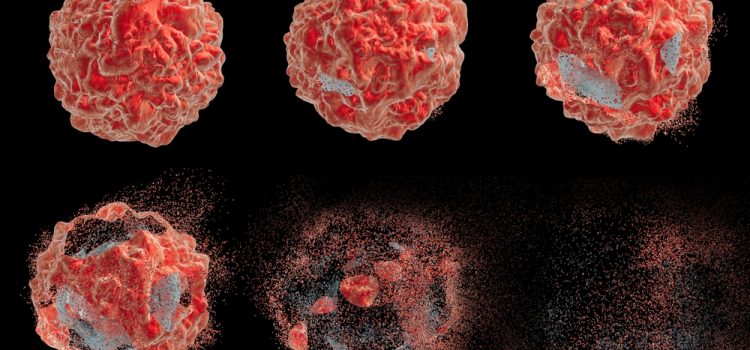Using Nanoparticles to Kill Cancer

Nanoparticles are tiny particles with at least one dimension no bigger than 100 nanometers. When compared with the same material on a larger scale, they exhibit unique characteristics which are now being researched for use in biomedicine and electronics. The nanoparticles at the center of a new study – called Cornell dots, or C dots – are ultrasmall, fluorescent silica particles, with a diameter of 5 nanometers.
A recent article in Medical News Today outlines the surprising discovery that the fluorescent nanoparticle can kill cancer cells by triggering a type of cell death. One of the lead researchers in Cornell University study, Professor Ulrich Wiesner, says “If you had to design a nanoparticle for killing cancer, this is exactly the way you would do it”.
The nanoparticles were originally developed by Prof. Wiesner a decade ago, with the purpose of using them as a tool during cancer surgery. They attach themselves to cancer cells and illuminate them so surgeons can identify where to cut. Although the particles were also meant to assist in targeting drug delivery, recent discoveries indicate that the particles can kill cancer cells without carrying drugs. Instead, the nanoparticles exhibit intrinsic therapeutic properties well tolerated by normal healthy tissue.
The researchers carried out several experiments over several years. To their surprise, they discovered that high doses of peptide-coated Cornell dots, when incubated with cancer cells, took iron from the environment and delivered it into the cancer cells. Delivering iron into the cells triggers ferroptosis, which ruptures the cell membrane. Professor Wiesner asserts that within 48 hours of exposure to Cornell dots, a “wave of destruction” swept through the entire cancer cell culture. In later tests on laboratory mice with melanoma tumors, they observed the tumors shrinking without adverse reactions to healthy cells. The researcher’s next plans involve testing Cornell dots with other standard therapies, and in different kinds of cancer tumors. There is still more work to be done before these findings can be tested on humans.
********
Integrity Locums specializes in partnering top medical professionals with career opportunities in all disciplines, across the country. Search our listings to find your new challenge.
